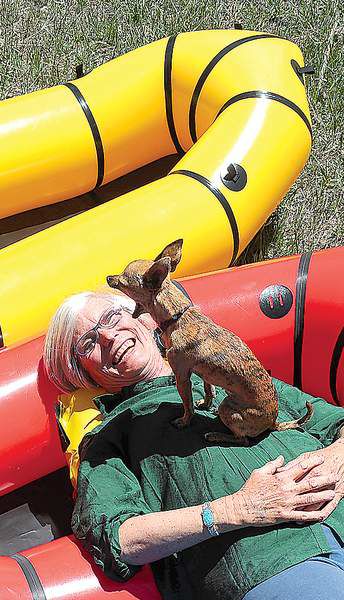Colorado firm redefines adventure
Published 5:00 am Sunday, May 15, 2011

- Sheri Tingey and shop dog Rosalee show off some her Alpacka rafts. Tingey’s company, located in tiny Mancos, Colo., specialize in handmade single-person rafts that are light enough to be carried in a backpack.
MANCOS, Colo. — Like knobby-tired mountain bikes and hardshell kayaks, Sheri Tingey’s Alpacka rafts have transformed the way people explore.
“They have completely changed the game,” said Steve Fassbinder, a Mancos athlete who had Tingey craft a custom raft to carry his bike and now pedals to remote rivers that he descends.
The 5-pound rafts, which cost $820, roll into a tube the size of a small tent and can easily float a 250-pound person with a 100-pound pack. They are credited with opening vast swaths of wilderness to adventurers in Alaska, where Tingey first created her revolutionary raft a decade ago.
Today, from her home shop in Mancos in southwestern Colorado, Tingey and her nine employees hand-weld and constantly improve the virtually indestructible crafts that have created their own subculture of backpacking, known as packrafting.
A mingling of the light-is-right backpacking culture with the much different whitewater culture, packrafting enables expedition-style adventures in the most remote areas of the planet. Where travel previously was limited to relentless bushwhacking along tiny drainages incapable of floating traditional gear-laden crafts, Tingey’s Alpackas — as in “I’ll pack a …” — have become the exalted tool.
“It gets you into places where you don’t run into a single person,” said Tingey, a 65-year-old tinkerer who began making ski clothes in Jackson Hole, Wyo., in the late 1960s before designing kayak gear and launching Alpacka 10 years ago. “It’s just totally opened up the backcountry.”
In Mancos, where she recently expanded the shop she first erected four years ago, Tingey joins a growing list of manufacturers who are helping to spark the Four Corners economy. Although her six full-time and three part-time employees rank in the middle of the local manufacturing workforce, Alpacka is helping establish the area as a business-friendly region, ripe for more players.
“A lot of business owners are drawn to that area for the quality of life and recreational opportunities,” said Monty Rutherford, regional director for the Colorado Association for Manufacturing and Technology.
Unemployment in the area is at 11.2 percent, Rutherford said, which appeals to potential employers looking for an eager workforce. Alpacka is among several businesses in western Colorado that have grown in the faltering economy, Rutherford said.
“Having visited with her and other businesses that were growing, they all tended to be in the recreation field,” Rutherford said. “It seems like people are staying closer to home and doing things with their families and that has helped some businesses like Alpacka.”
Enabling more accessible recreation is a goal for Tingey. A whitewater kayaking pioneer in the 1970s, Tingey today eschews the gnarly descents of her youth, choosing instead to forge new experiences floating the most remote waterways in the world.
With shocks of gray hair falling from a faded bandanna, Tingey works on new Alpacka revisions every day in her shop, while her employees rotate through every task, from welding seams to cutting designs to shipping orders.
An idea is afloat
It was in the late 1990s when Tingey’s son, Thor, came back from an extended backpacking trip in Alaska’s rugged Brooks Range. Throwing down the cheap lake float he had used to traverse several rivers — crossings that often resulted in dangerously cold swims — Thor uttered the timeless words that have sparked nearly every innovation: “There’s got to be a better way.”
Mom’s ears perked up with what is still her mantra. With her kayaking background and skill at designing outerwear, Tingey says “it wasn’t a stretch” to come up with that better way.
Starting with the inexpensive lake-floating “pool toy” crafts that “sunk around every bend” in a river, Tingey began dabbling with urethane-coated rubber and a tear-resistant polyethylene fiber that serve as the lightweight foundation of Alpacka’s designs. Tingey’s focus was simplicity and durability in a featherweight package. She says her boats should last 20 years, and she offers a sweeping warranty for her seven Alpacka designs.
Combining backpacker-friendly weight with whitewater designs found in kayaks, Alpacka quickly became essential for explorers in Alaska, where rivers are the true highways.
“There are places you can get to that you never could get to before unless you spent a bunch of money on a bush plane or swam down a river,” said Roman Dial, a biology professor at Alaska Pacific University whose 2008 book “Packrafting!” helped ignite the Alpacka revolution.
Dial has paddled his Alpacka down huge whitewater, most recently descending Tasmania’s remote Class IV Franklin River. He’s floated his Alpacka in 11 Alaska Wilderness Classics, setting course records in what is considered one of the world’s most-grueling backcountry races. While he still gets his thrills exploring the limits of packrafting, he says today he enjoys introducing newcomers to Tingey’s crafts.
“As soon as they get in, they get this big, wide grin,” Dial said. “Everyone can paddle a packraft.”






